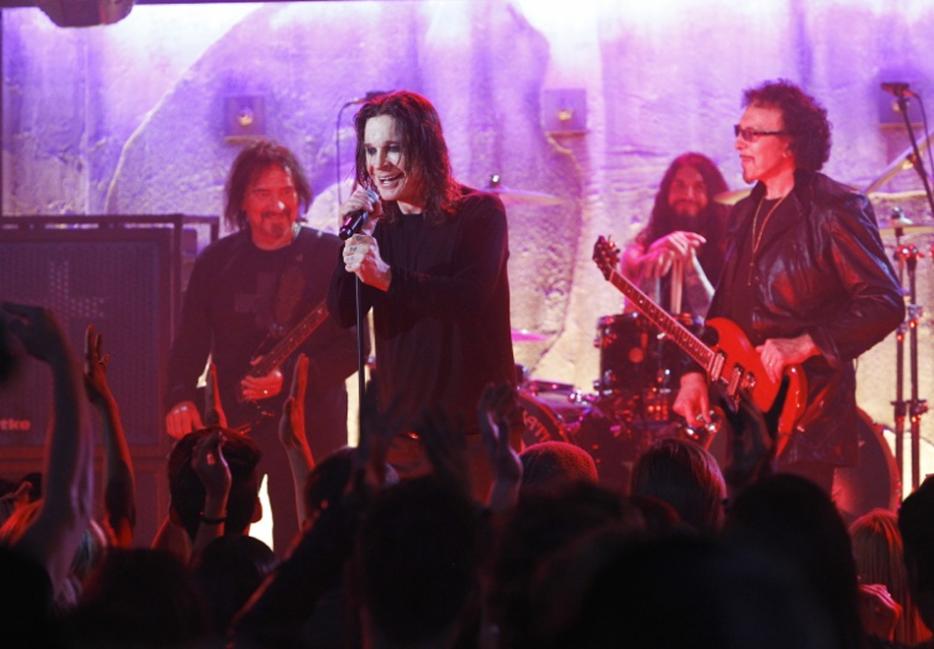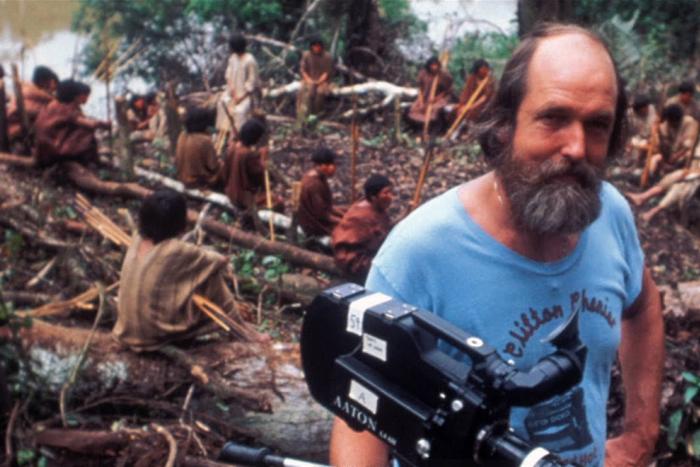There’s a Kids In The Hall bit, in the style of a ‘50s newsreel, which tackles a question that’s been dogging mankind since the invention of kneeling: “Yes,” we’re told, “God did exist. He died. He was very small. Mystery solved.” To prove it we’re shown the corpse, under a blanket, no bigger than a child. A priest holds up God’s tiny hockey jacket. On the back is the word GOD. Mourning is brief, says the narrator, and “then it’s business as usual on the streets and highways that God built!”
I thought about the Kids sketch listening to the new Black Sabbath single, “God Is Dead?” and reflecting on that question mark: it seems Ozzy Osbourne, now back with the band after 35 years, has existential doubts. “When you think about the tragedy that’s happened throughout time,” he said after the release of the nine minute bro-metal epic, “it just came in my head... Where is God? God is dead—and it just hit me.” For Sabbath, this is complex theology indeed. Ozzy wants to know. He wants to see the body.
Musically, the song is boilerplate. For all I know it was recorded by a particularly gifted Sabbath cover band, although Joey Belladonna of Anthrax, who has sharper ears than mine, said after hearing the cut, “Ozzy is louder than normal.” That’s not the point. The point is that Sabbath is now thick in the tradition of artists who’ve tried to make the search for a living (or otherwise) God dramatically interesting, which is hard. Most art that’s infused by belief is transparent: aesthetically pleasing but dull. Writers who have figured it out one way or the other give us flat characters with nothing at stake. But doubt—if not in the writer, then in the writing—is compelling. “We Catholics,” wrote Flannery O’Connor, “are very much given to the Instant Answer. Fiction doesn’t have any. It leaves us, like Job, with a renewed sense of mystery.”
Both faith and fiction thrive on mystery. Without it there’s no story, just the makings of a Church pamphlet: here’s the truth, the good news. Carry on. But O’Connor made wicked sport of both religious certainty and its opposite, with the character Hazel Motes from the novel Wise Blood, who is so spiritually burned by his holy-roller upbringing that he launches his own “Church Without Christ” to expose the lies of the gospels: God is not dead, He never existed. But his own doubts lead him, by the end, to put his own eyes out, the better to black out the insistent hammering of grace, a haunting vision of Christ hiding behind the trees. He becomes a blind prophet. Of what, it’s up to the reader to decide.
In any case, O’Connor leaves us alone with the mystery, the root of her own faith: “That belief in Christ is to some a matter of life and death,” she wrote in the preface to Wise Blood, “has been a stumbling block for readers who would prefer to think of it as a matter of no great consequence. For them Hazel Motes’ integrity lies in his trying with such vigor to get rid of the ragged figure who moves from tree to tree in the back of his mind. For the author, Hazel’s integrity lies in his not being able to.” Hazel doubts his own atheism, and for O’Connor that’s close enough to be called faith. Is God dead? Did He ever exist? The question mark will suffice: you’re in the club. Help yourself to a wafer and a cup of wine.
Flannery O’Connor, along with Walker Percy (who won the U.S. National Book Award in 1962 for his novel The Moviegoer), Thomas Merton, and Dorothy Day, made up what’s been called the “Holy Ghost School”: Catholic writers of the middle of the last century, who, like the existentialists of the time, poked at the gap left by God’s apparent absence in the hopes that something, if not His own little hockey jacket, might turn up. In 1981 Percy wrote “The Second Coming,” in which Will Barrett, a middle-class underachiever and lost soul, with more money than spiritual clarity, sets out to determine, once and for all, if there is anybody up there:
“My project,” writes Will, to his friend and accomplice, “is the first scientific experiment in history to settle once and for all the question of God’s existence. As things presently stand, there may be signs of his existence but they point both ways and are therefore ambiguous and so prove nothing. For example, the wonders of the universe do not convince those most conversant with the wonders, the scientists themselves. Whether or not this testifies to the stupidity of the scientists or to God’s success at concealing himself doesn’t matter.”
In short, he decides to repair to a mountain cave near his country club in North Carolina with enough sleeping pills to last him however long it will take him to starve to death without anxiety or pain. His death will look like an accident. Will’s insurance company will have to pay out on his policy. The only thing that will cause Will to leave the cave is a legitimate sign from God. “So it was,” writes Percy, “that Will Barrett went mad.”
After a few days, Will Barrett develops a horrible toothache. He can’t take the pain and climbs out, soon forgetting why he was there in the first place. “There is one cure for cosmic explorations, grand ideas about God, man, death, suicide, and such,” says Will, “and that’s nausea... What does a nauseated person care about the Last Days?” How dull it would be if Percy made us see, without ambiguity, that the toothache was a sign from God. Instead he leaves the whole “project” as a grim joke leavened by gravity. This is what made him, and O’Connor, great artists: the light touch shadowed by the most urgent of questions. Something happens to Will, either divine or banal. In either case it changes his life. Dostoevsky played this game too: it helps to read The Brothers Karamazov as a comic novel about family mix-ups under which beats the urgent question: if God is dead, then is everything, even murder, permitted?
That’s Ozzy’s concern. In “God Is Dead?” he sings:
“Help me make it through the night,
Blood on my conscience and murder in mind...
The voices echo in my head,
Is God alive or is God dead?”
He might have left it at that but by the song’s climax (sorry for the spoiler) he sings, “I don’t believe God is dead.” Rats. He was well on his way to echoing the work of the Holy Ghost School, with its taste for mystery, and for the value of questions without Instant Answers. In the Black Sabbath world, it turns out, it’s business as usual on the streets and highways that God built.






